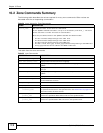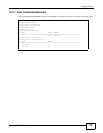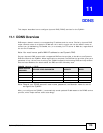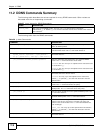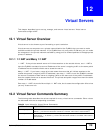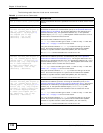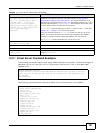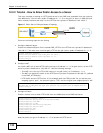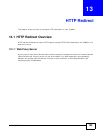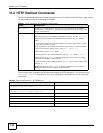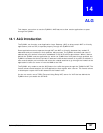
Chapter 12 Virtual Servers
ZyWALL (ZLD) CLI Reference Guide
120
The following table lists the virtual server commands.
Table 60 ip virtual-server Commands
COMMAND DESCRIPTION
show ip virtual-server [profile_name] Displays information about the specified virtual server or about all the virtual
servers.
no ip virtual-server profile_name Deletes the specified virtual server.
ip virtual-server profile_name
interface interface_name original-ip
{any | ip | address_object} map-to
{address_object | ip} map-type any
[nat-loopback [nat-1-1-map]
[deactivate] | nat-1-1-map
[deactivate] | deactivate]
Creates or modifies the specified virtual server and maps the specified
destination IP address (for all destination ports) to the specified destination
address object or IP address. The original destination IP is defined by the
specified interface (any), the specified IP address (IP), or the specified
address object (address-object). NAT loopback allows local users to use a
domain name to access this virtual server.
Select what kind of NAT this rule is to perform.
nat-1-1-map: means the NAT type is either 1:1 NAT or many 1:1 NAT. See
Section 12.1.1 on page 119 for more information.
Using this command without nat-1-1-map means the NAT type is Virtual
Server. This makes computers on a private network behind the ZyWALL
available to a public network outside the ZyWALL (like the Internet).
The deactivate command disables the virtual server rule.
ip virtual-server profile_name
interface interface_name original-ip
{any | IP | address_object} map-to
{address_object | ip} map-type port
protocol {any | tcp | udp} original-
port <1..65535> mapped-port
<1..65535> [nat-loopback [nat-1-1-
map] [deactivate] | nat-1-1-map
[deactivate] | deactivate]
Creates or modifies the specified virtual server and maps the specified
(destination IP address, protocol, and destination port) to the specified
(destination IP address and destination port). The original destination IP is
defined by the specified interface (any), the specified IP address (IP), or the
specified address object (address-object). NAT loopback allows local users
to use a domain name to access this virtual server.
nat-1-1-map: means the NAT type is either 1:1 NAT or many 1:1 NAT. See
Section 12.1.1 on page 119 for more information.
Using this command without nat-1-1-map means the NAT type is Virtual
Server. This makes computers on a private network behind the ZyWALL
available to a public network outside the ZyWALL (like the Internet).
The
deactivate command disables the virtual server rule.
ip virtual-server profile_name
interface interface_name original-ip
{any | IP | address_object} map-to
{address_object | ip} map-type ports
protocol {any | tcp | udp} original-
port-begin <1..65535> original-port-
end <1..65535> mapped-port-begin
<1..65535> [nat-loopback [nat-1-1-
map] [deactivate] | nat-1-1-map
[deactivate] | deactivate]
Creates or modifies the specified virtual server and maps the specified
(destination IP address, protocol, and range of destination ports) to the
specified (destination IP address and range of destination ports). The original
destination IP is defined by the specified interface (any), the specified IP
address (IP), or the specified address object (address-object). NAT
loopback allows local users to use a domain name to access this virtual
server.
nat-1-1-map: means the NAT type is either 1:1 NAT or many 1:1 NAT. See
Section 12.1.1 on page 119 for more information.
Using this command without nat-1-1-map means the NAT type is Virtual
Server. This makes computers on a private network behind the ZyWALL
available to a public network outside the ZyWALL (like the Internet).
The deactivate command disables the virtual server rule.



